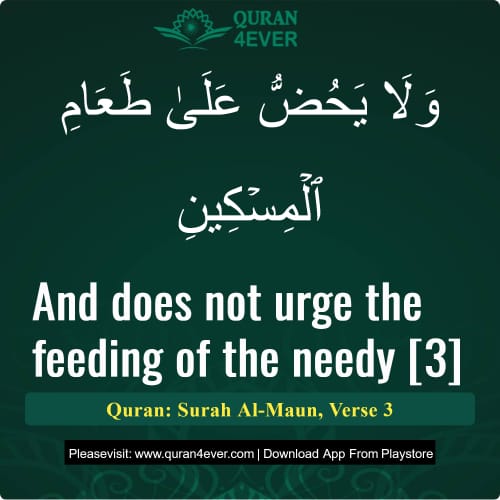
Transliteration:( Wa la yahuddu 'alaa ta'aamil miskeen )
The verse addresses the actions of those who oppress orphans and seize their wealth. The focus is on individuals who neglect the consequences of the Day of Judgement, which results in their unjust actions toward the weak and helpless. Had they remembered their own vulnerability on that Day, they would have refrained from oppressing orphans and committing other wrongs.
Oppressing Orphans as a Sign of Rejecting the Day of Judgement:
The verse establishes a connection between oppressing orphans and denying the Day of Judgement. The act of exploiting the vulnerable is portrayed as a clear indication of rejecting the afterlife and the accountability that comes with it. If individuals truly believed in the consequences of their actions on the Day of Judgement, they would avoid such injustice.
Social Responsibility for All:
Even the infidels are reminded that they are bound by social responsibilities and ethical conduct. The verse implies that in an Islamic state, the head of state would enforce laws to prevent crimes like oppression, theft, and exploitation. This ensures that even those who do not believe in the afterlife are held accountable for their actions in this world, and they will also face consequences in the Hereafter for their misdeeds.
The verse reinforces the idea that awareness of the Day of Judgement should shape one's actions and ethical conduct, urging not only believers but also non-believers to act justly in society.
The tafsir of Surah Maun verse 3 by Ibn Kathir is unavailable here.
Please refer to Surah Maun ayat 1 which provides the complete commentary from verse 1 through 7.
(107:3) and urges[6] not the feeding of the needy.[7]
6. La yahuddu means that the person neither persuades his own self, nor tells the people of his household, to provide the poor man with his food, nor does he urge others to recognize the rights of the poor and needy people of society who are starving and do something to satisfy their hunger.
Here, by giving only two conspicuous examples, Allah has pointed out what kind of evils are produced in the people who deny the Hereafter. The real object is not to point out only these two evils that the people drive away the orphans and do not urge giving away the food of the poor as a result of the denial of the Hereafter. But of the countless evils which are thus produced, two evils have been presented as an example, which every noble and sound-natured person will regard as hateful. Besides, another thing meant to be impressed is that if this very man had believed that he would have to go before God to render an account of his deeds, he would not have committed such evils as to deprive the orphan of his rights, tyrannize him, repulse him, neither feed the poor man himself nor urge others to give him his food. The characteristics of the believers in the Hereafter which have been described in Surah Al-Asr and Surah Al-Balad are that they exhort one another to mercy, and they exhort one another to the truth and to render the rights of others.
7. The words used are to taam-il-miskin and not itam-ilmiskin. If itam-il-miskin were the words, the meaning would be that he does not urge (others) to feed the poor. But taam -il-miskin means that he does not urge (others) to give away the food of the poor. In other words, the food that is given to the poor man is not the food of the giver but of the poor man himself; it is his right which is enjoined on the giver, and the giver is not doing him any favor but rendering him his right. This same thing had been said in Surah Adh-Dhariyat: And in their possessions is a due share of him who asks and of him who is needy. (Surah Adh-Dhariyat, ayat 19).

For a faster and smoother experience,
install our mobile app now.
Related Ayat(Verses)/Topics